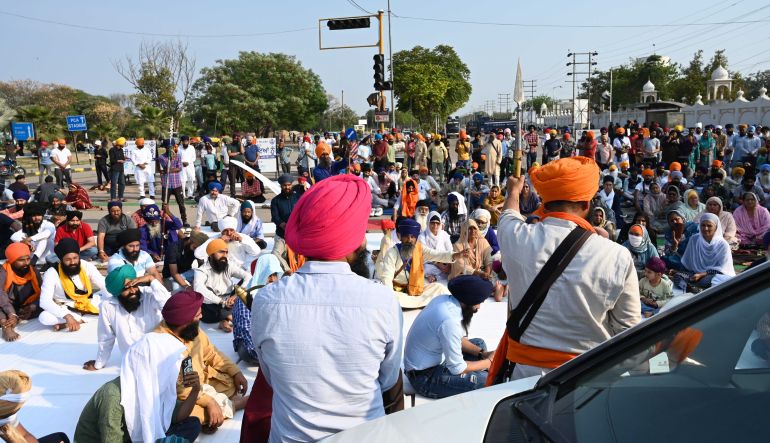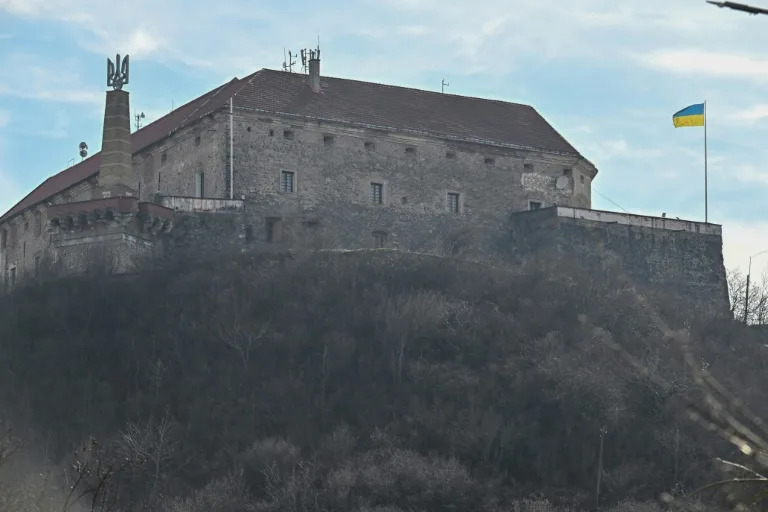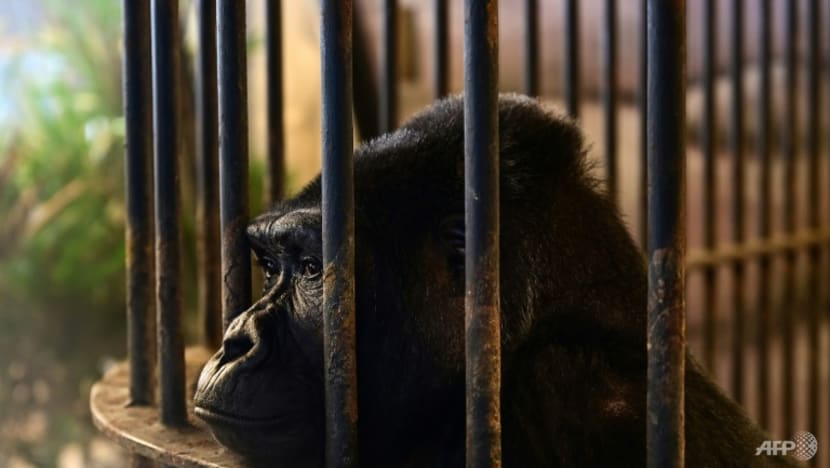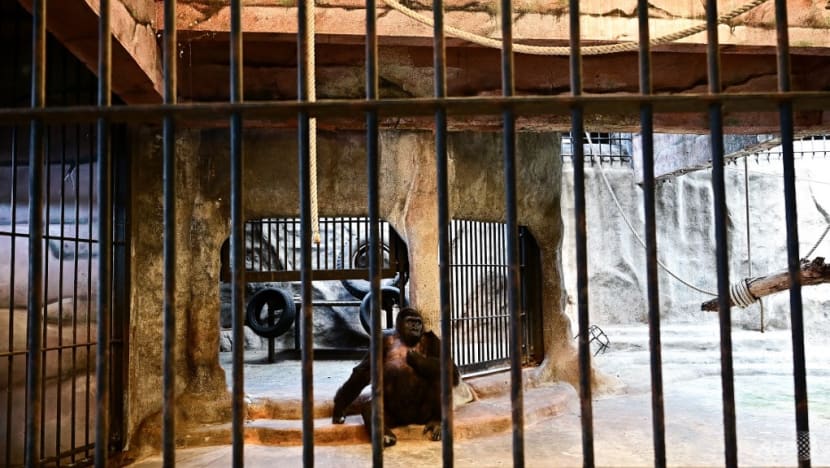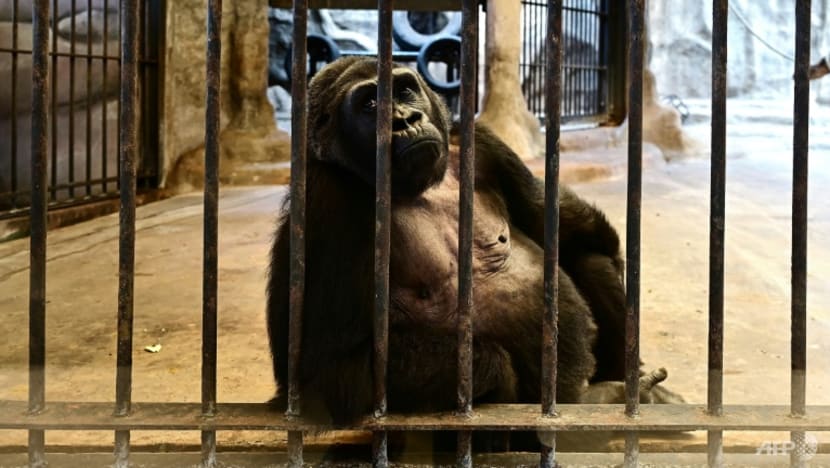India arrests more than 100 people in manhunt for Sikh separatist
Amritpal Singh, 30, rose to prominence in recent months demanding the creation of Khalistan, a separate Sikh homeland.
Story by Moohita.Garg • Yesterday
Authorities in the north Indian state of Punjab have extended a mobile internet blackout across the region. The internet blackout affecting 30 million people has been put in place as the police hunt for radical Sikh preacher Amritpal Singh. As per AFP, the blackout extension comes after a violent incident, where followers of the preacher vandalised the Indian consulate there.

As search for 'Khalistan' preacher Amritpal Singh continues, Punjab's internet blackout extended© Provided by WION
The internet outage, which was originally put in place until Monday noon local time, has been extended for another 24 hours.
Watch | Khalistani supporters vandalise Indian High Commission in London
According to the nation's foreign ministry, India has reminded the US government "of its basic obligation to protect and secure diplomatic representation."
Washington "was asked to take appropriate measures to prevent recurrence of such incidents," the ministry added.
Also read | India: 'Khalistan' figure Amritpal Singh's uncle, driver surrender in Punjab's Jalandhar
Related video: Amritpal Singh Update: Khalistan supporter Amritpal Singh in radar of Punjab Police and Central Agencies (Zee News)
Duration 15:11
View on Watch
More videos

India TodayWas Punjab govt slow to act against Amritpal Singh?
21:25

News18Free Run For Khalistani-Radicals? | Amritpal Singh On The Run | Khalistan Amritpal Singh News
30:29

Zee NewsKhalistan Leader Amritpal Arrest: Punjab Police arrested Amritpal and his 6 supporters – sources
9:31
The US State Department condemned the vandalism and said it was "committed to the safety and security of these facilities as well as the diplomats who work within them".
AFP reports that Police have arrested 114 people, however, the whereabouts of the radical preacher are still unknown.
Also read | MEA lodges 'strong protest' with UK after Indian mission is vandalised by Khalistani extremists
Singh, as per reports, rose to prominence in recent months. On Saturday, authorities launched a major search for the radical leader who is one of the major proponents behind the demand for the creation of Khalistan, a separate Sikh homeland.
Videos posted online show men — Singh's supporters — smashing windows and doors at the Indian consulate in San Francisco after breaking barricades set up outside the building. Several of them sprayed the phrase #FreeAmritpal on the walls outside.
(With inputs from agencies)
Shutdown imposed as part of search for Amritpal Singh Sandhu, accused of disrupting communal harmony
Amrit Dhillon in Delhi
Economic life in the north Indian state of Punjab has been paralysed by an internet shutdown, affecting 30 million people, imposed as part of a huge manhunt for a Sikh preacher fighting for a separate Sikh state.
Police have been searching for Amritpal Singh Sandhu, who is wanted for allegedly disrupting communal harmony, since Saturday.
The internet and SMS shutdown was imposed to stop the spread of fake news but it has also paralysed shops, businesses, colleges and digital payments for everyone in the state. Originally in place until noon (0630 GMT) on Monday, the outage was extended for a further 24 hours.

Flicking the kill switch: governments embrace internet shutdowns as a form of control
The extension came after supporters of Singh were filmed vandalising India’s consulate in San Francisco. A similar disturbance took place in London.
In India, more than 100 of Sandhu’s followers have been arrested but he remains on the run. The police were close to arresting him in Bathinda on Saturday when they intercepted his car but Sandhu got away in the ensuing melee.
The preacher was unknown until recently although authorities claim he has been building up a “militia” to fight for independence for some time.
The radical Sikh preacher burst into the national consciousness on 23 February through the audacious rescue of a key aide, Lovepreet Singh Toofan, from police custody.
With a gang of followers brandishing swords and guns, Sandhu stormed the police station in Ajnala demanding Toofan’s release.
Police capitulated to his demand, saying they could not target Sandhu because he was using the Sikh holy book as a shield.
The home minister, Amit Shah, has put the border police on alert to ensure Sandhu does not flee the country.
In February, Sandhu threatened Shah, saying he would meet the same fate as the former prime minister Indira Gandhi, who was assassinated by her Sikh bodyguards in 1984.
From the mid-1980s Punjab was convulsed by violence and carnage under a decade-long reign of terror created by armed separatist groups trying to create a Sikh state called Khalistan.
The movement was eventually defeated but it left, according to official estimates, more than 20,000 dead, over half of them civilians caught between the police and the militants.
Apart from a brutal police crackdown on the separatists, another reason for their defeat was loss of support among Sikhs sickened by their indiscriminate violence.
The state has been peaceful since about 1993 but the experience has left a permanent scar on the Indian state. Fear of a revival has lingered, exacerbated by the fact that Punjab borders India’s arch-rival Pakistan.
Analysts say the Punjab state government and New Delhi have been blindsided by Sandhu’s activities and the apparent support he has found among a few disaffected Sikhs.
Little is known about Sandhu except that he is 30 and leads a group called Waris Punjab De (roughly translated as Heirs of Punjab). He became active in Punjab after returning to India last year from Dubai to take over from the group’s leader who had died in a car accident.
Amritpal Singh (activist)
Amritpal Singh Sandhu | |
|---|---|
 Singh in 2022 | |
| 2nd Jathedar of Waris Panjab De | |
| Assumed office 29 September 2022 | |
| Preceded by | Sandeep Singh Sidhu |
| Personal details | |
| Born | January 17, 1993 Jallupur Khaira,[1] Baba Bakala, Amritsar, Punjab, India |
| Known for | Khalistani Separatism[2] |
Amritpal Singh Sandhu[3][4] (born 17 January 1993)[5] is a radical[9] Indian Khalistan separatist,[12] a self-styled Sikh preacher and leader of the organisation Waris Panjab De from Punjab, India.[14] He rose to prominence in September 2022 after he returned from Dubai to India to become the leader of the organisation after the death of its previous leader Deep Sidhu in a car accident. He is currently a wanted fugitive in India.[18] He has been reported to have close links to Pakistan's Inter-Services Intelligence and terror groups,[23] and is reported to have received training from the same.[24] He has also been reported to have been raising his own army and 'human bomb squads' consisting of brainwashed youth as suicide bombers idolising Dilawar Singh.[25][26]
Early life
Amritpal Singh grew up as a resident of Jallupur Khera in the Amritsar district. He was the youngest of the three children of Tarsem Singh and Balwinder Kaur.[4] His family is said to be very religious.[13] After passing 10th class, he enrolled in a diploma course in mechanical engineering at Lord Krishna Polytechnic College in Kapurthala in 2009. He dropped out after three years, never having completed the course. He has also said the he hasn't ever read a book.[27][13]
In 2012, he moved to Dubai in UAE to join his family's transport business.[28] His LinkedIn profile claimed that he has a mechanical engineering degree from the University of Punjab.[28] His profile further claimed that he was the "Operations Manager" at a company called Sandhu Cargo Transport and that he had experience in transportation, trucking and railroad industry.[29] According to Indian Express he worked as a dispatcher for about ten years.[30]
Amritpal often spoke about issues concerning Punjab on social media. In 2019, he started supporting the farmers' protest and also became a vocal supporter of Deep Sidhu. His social media reach multiplied after he got associated with Sidhu. He travelled to India to support the protest. At that time he was a Mona Sikh (Sikh without a beard and turban). After the farm laws were withdrawn, he returned to Dubai.[4][29]
Waris Punjab De
During the farmers' protest, the actor-turned-activist Deep Sidhu attempted to broaden the agenda of the agitation into fighting for the "rights of Punjab". Amritpal Singh is said to have been a vocal supporter of Sidhu and his role in the agitation.[31] Sidhu is alleged to have led a group of farmers to storm the Red Fort in Delhi on the Republic Day of 2021. He was arrested for the action and spent a few months in prison. After getting released on bail, he founded the Waris Punjab De ("Heirs of Punjab") organisation to fight for what he termed the rights of Punjab.[32]
Amritpal Singh also became a part of Waris Punjab De, remotely from Dubai.[32] In one of his interviews, he claimed that he worked closely with Sidhu in starting the organisation.[33]
Succession to Deep Sidhu
After the sudden death of Deep Sidhu,[34] a letter was published by Waris Panjab De on 4 March 2022 declaring Amritpal Singh as the organisation's leader.[citation needed] Singh returned to Punjab in August 2022 with a flowing beard and turban.[29] He also gave up his role in the family's business and a permanent resident status in Canada.[13] An official inauguration ceremony was held on 29 September 2022 at Rode in Moga, the native village of the former militant separatist Jarnail Singh Bhindranwale.[35] He took Amrit in Anandpur Sahib after being elected.[4] His succession is disputed by some aides of Sidhu and critics claim that he was not endorsed by Sidhu's family.[1] Sidhu's brother stated that Sidhu blocked Amritpal's phone number for fifteen days in the past and that Singh's succession to the position was illegal.[36]
Campaigning and Prachaar
On 25 September 2022, he announced his presence in Punjab and participated in the large gathering at holy city of Anandpur Sahib. Later on, he started his first phase of Punjab tour, Khalsa Vaheer which started from Akal Takhat Sahib, Amritsar[37]
In Sri Ganganagar, Rajasthan in October 2022, Singh's first Amrit Parchaar campaign took place, where around 647 people took Amrit (sanctified water) and became part of the Khalsa order. Next he started a 'Ghar Wapsi' (religious conversion) campaign where 927 Sikhs, Hindus and Christians in Anandpur Sahib took Amrit making headlines on newspapers, the Haryana Gurudwara Parbhandak Committee under the Haryana Government gave him support.[38] Afterwards he held another large Amrit Parchaar campaign in Amritsar where 1,027 Sikhs and Hindus from across India took Amrit to became Khalsa Sikhs.[13]
On 23 November, the 'Waris Punjab De' organisation started a "Khalsa Vehir" campaign.[39] He also organised Amrit Sanchar and anti-drug campaigns.[40]
Khalistan and Bhindranwale styling
Amritpal openly supports the cause of Khalistan, the separatist movement calling for a separate homeland/country for people of Sikh faith. He has given several statements in which he openly rallies for Khalistan stating, "Our aim for Khalistan shouldn't be seen as evil and taboo. It should be seen from an intellectual point of view as to what could be its geopolitical benefits. It's an ideology and ideology never dies. We are not asking for it from Delhi". He further stated in a separate instance that the Khalistan sentiment will remain in the population and that no one can suppress it.[41] He threatened Union Home Minister Amit Shah, saying that he will meet the same fate as Indira Gandhi, who was assassinated by her Sikh bodyguards in 1984.[42]
Singh has stated in the past that Khalistani militant Jarnail Singh Bhindranwale, who was killed in Operation Blue Star in 1984, is his hero.[13] He dresses and presents himself in a similar manner, wearing a turban and traditional robes[43] and moving with heavily armed men around him.[2][42] He also entered the Golden Temple with a group of armed men called Faujaan.[44] His supporters also hail him as a second Bhindranwale.[45]
Participation in violence
In November 2022, Sudhir Suri, a Shiv Sena Politician was murdered by Sandeep Singh Sunny, who allegedly had a Waris Punjab De sticker on his vehicle. Punjab Police placed Amritpal Singh under a preemptive house arrest briefly, as a precautionary measure in anticipation of retaliatory violence against him, although he had no prior connection with Suri nor with the murder. After being released from house arrest, Singh did an Amrit Parchaar campaign in Haryana.[46][47]
On 9 December 2022, Amritpal's supporters vandalised a gurudwara in Biharipura and then later on 13 December, vandalised a gurudwara in Jalandhar. They burned the chairs and sofas at these two gurudwaras claiming that one must not pray while sitting at the level of the Guru Granth Sahib at the gurudwara.[48][49]
Ajnala Clash
In February 2023, a man complained in an Ajnala police station stating he was kidnapped and beaten by the associates of Amritpal Singh. An FIR was registered against Amritpal Singh and six of his associates. The police arrested one of his close associates, Lovepreet Singh Toofan.[50]
After the arrest, Amritpal Singh issued an "ultimatum" to Punjab Police to revoke the case and, when the police did not respond, his supporters broke through police barricades and stormed the police complex, armed with automatic guns and sharp weapons.[51][7] Several police personnel were injured and police vehicles were damaged. According to Senior Superintendent of Police Satinder Singh, the police could not retaliate because the supporters of Amritpal Singh had styled their group like a Jatha, carrying the Guru Granth Sahib.[7]
Punjab police later released Lovepreet Singh after the court ordered his release based on the police report.[52][41][53]
In an interview to NDTV on 25 February 2023, Amritpal alleged that the police filed a "false case" against Lovepreet. As a result, he and hundreds of Waris Punjab De supporters went to meet the police at Ajnala where Lovepreet Singh was kept. He also said that the media is misleading people about the Ajnala incident.[54]
Crackdown by authorities
On 18 March, the Punjab Police initiated a crackdown against Waris Punjab De, arresting 78 persons and detaining several others for questioning.[a] Amritpal Singh was reported to be absconding.[17] In the hunt to arrest Singh, the police have set up road blocks around the region, and were involved in a car chase, but Singh managed to escape.[56] Mobile Internet services in Punjab were suspended and text messaging services were disabled during the weekend, until the afternoon of 21 March, affecting 27 million people.[57][17][58] Gatherings of more than four persons were prohibited in Chandigarh under Section 144 of the Criminal Procedure Code.[59]
Reactions
Diasporic Sikhs protested the actions of the authorities against Amritpal Singh and a mob of protesters attacked the Indian consulate in San Francisco. A mob also attacked the Indian High Commission office in London and attempted to pull down the Indian flag off the pole. The flag was restored and Indian External Affairs Ministry summoned the British deputy high commissioner Christina Scott for an explanation.[60][61] Similar protests also took place in Auckland, New Zealand.[62][63][64]
British Sikh Labour MP Tanmanjeet Singh Dhesi criticised the Indian government's actions.[65] Concerns about the situation were also raised by Canadian Sikh MPs.[66] The World Sikh Organization of Canada criticised the manhunt as "draconian" and a "means to intimidate his supporters to silence".[67]
Akal Takht Jathedar, Giani Harpreet Singh, accused the authorities of "creating an atmosphere of terror in the state".[68] Journalists, politicians, and celebrities who criticised the heavy-handed response of the government have had their social media accounts blocked in India.[69] The SGPC has demanded the police "stop arresting innocent youth".[70]
Controversies
In October 2022, in one of his speeches, Amritpal said, "Jesus who could not save himself, how he will save everyone else?" which was termed hate speech by members of the Christian community. The Christian community staged a four hours-long protest against Amritpal at PAP Chowk for his remarks about Jesus Christ. The protesters demanded that an FIR should be lodged against him under 295A of the IPC (Indian Penal Code) for "hurting religious sentiments and attempting to aggravate communal divisions".[71][72][73]
In October 2022, the president of Bharatiya Kisan Union Joginder Singh Ugrahan criticised Amritpal Singh saying, “He is just a Class XII pass out and has no experience with issues of farming and Punjab. The worst is that he is associated with a party which calls Shaheed Bhagat Singh a terrorist."[36]
On 2 October 2022, the president of the Shiv Sena (Uddhav Thackeray), Punjab youth wing held a press conference and urged the state government to arrest Amritpal for his "seditious activities". He accused Singh of styling himself like Jarnail Singh Bhindranwale and surrounding himself with armed men. He further added that Singh doesn't preach Sikhism and rallies for secession of a Sikh state from India.[74]
On 7 October, the Twitter account of Amritpal was withheld in India for his remarks and pro-Khalistani tweets.[4] The Ministry of Home Affairs also instructed the state government of Punjab to remain vigilant over his activities.[75]
With Amritpal's Facebook account already being suspended, his Instagram account was suspended on February 25, 2023. In retaliation, Amritpal supporters clashed with the police, resulting in six policemen being injured.[76][77]
GO TO WIKIPEDIA FOR FOOTNOTES
